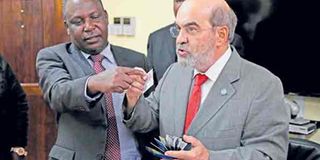FAO assured of action to curb hunger

Food and Agriculture Organisation director general José Graziano da Silva shows a mobile library to Agriculture, Livestock and Fisheries minister Charles John Tizeba after handing over computers and phones to the government to improve research in agriculture in Dar es Salaam on Tuesday. PHOTO | EMMANUEL HERMAN
What you need to know:
The VP was addressing dignitaries, including food and agricultural stakeholders, who convened in Dar es Salaam at an event to mark 40 years since FAO’s inception in Tanzania.
Dar es Salaam. Vice President Samia Suluhu Hassan on Tuesday night assured the Food and Agriculture Organisation (FAO) that Tanzania would take a leaf from initiatives developed by the UN agency on how to boost agriculture and curb hunger and malnutrition in the country.
The VP was addressing dignitaries, including food and agricultural stakeholders, who convened in Dar es Salaam at an event to mark 40 years since FAO’s inception in Tanzania.
FAO’s expertise in Tanzania is currently based on the 2017-2020 Country Programming Framework (CPF) centred on boosting agricultural productivity, improving market access, sustainable management of crises and shaping evidence-based agricultural policies.
Ms Hassan echoed an earlier statement on zero-hunger side effect made by FAO Director General Jose Grazio da Silva, who emphasised optimisation of the way stakeholders worked together in scaling up action to eradicate hunger and poverty. She said the implementation of the Country Programming Framework goes hand in hand with the implementation of the second phase of Tanzania’s development plan and MKUZA II (Zanzibar’s strategy for growth and reduction of poverty).
Tanzania joined FAO in 1962 before establishing its country office in 1977. The agency’s work on country concentrates on improving food security and the livelihood of smallholder farmers, thereby boosting economic growth in rural areas.
The Vice President said, “FAO knows what works and how it can be adopted to different contexts and national realities. So, we have to do it here in Tanzania.”
“These plans are geared towards promoting sustainable agriculture and prosperity. Our goal is to eradicate hunger and malnutrition once and for all,” she added.
On the sidelines of the event, FAO boss Grazio da Silva told The Citizen that the UN agency had helped the government to develop guidelines on climate change and agriculture, with emphasis on water management, pests and diseases, crop resistance and drought.
Reports show that the national climate smart agriculture guidelines aim at equipping smallholder farmers with requisite knowledge and skills for climate change adaptation.
“At the same time, FAO is assisting agricultural projects that are responsive to climate change, including the promotion of a system of rise intensification, which has tripled rice yields in targeted areas,” reports show.




